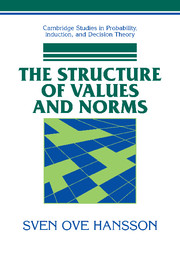Book contents
- Frontmatter
- Contents
- Preface
- PROLEGOMENA
- PART I VALUES
- 2 Exclusionary Preferences
- 3 Preference States
- 4 Changes in Exclusionary Preferences
- 5 Constructing Combinative Preferences
- 6 Pairwise Combinative Preferences
- 7 Decision-Guiding Combinative Preferences
- 8 Monadic Value Predicates
- PART II NORMS
- EPILOGUE
- Proofs
- References
- Index of Symbols
- General Index
8 - Monadic Value Predicates
Published online by Cambridge University Press: 13 August 2009
- Frontmatter
- Contents
- Preface
- PROLEGOMENA
- PART I VALUES
- 2 Exclusionary Preferences
- 3 Preference States
- 4 Changes in Exclusionary Preferences
- 5 Constructing Combinative Preferences
- 6 Pairwise Combinative Preferences
- 7 Decision-Guiding Combinative Preferences
- 8 Monadic Value Predicates
- PART II NORMS
- EPILOGUE
- Proofs
- References
- Index of Symbols
- General Index
Summary
In addition to the comparative notions, ‘better’ and ‘of equal value,’ informal discourse on values contains monadic (one-place) value predicates, such as ‘good,’ ‘best,’ ‘very bad,’ ‘fairly good,’ and so on.
We predicate concepts such as goodness not only of complete alternatives but also – and more often – of particular states of affairs. Just like combinative preference relations, monadic predicates will be assumed to refer to states of affairs. They will be inserted into a structure that contains a combinative preference relation, so that their relations to the comparative notions can be studied. Throughout this chapter,≥′ denotes a (weak) combinative preference relation that operates on the union ∪A of some contextually complete alternative set A. As before, >′ and ≡′ are its strict and symmetric parts. The more precise nature of ≥′ will be left open. Monadic predicates such as ‘good’ appear both in decision-guiding contexts where it would seem natural to connect them with a decision-guiding preference relation, and in other contexts in which a ceteris paribus preference relation may be more appropriate.
The standard reading of p>′q, “p is better than q,” implies no commitment whatsoever with respect to the truth values of p and q. If p does not hold in the actual world, then “p would be better than q” is a more accurate paraphrase.
- Type
- Chapter
- Information
- The Structure of Values and Norms , pp. 114 - 126Publisher: Cambridge University PressPrint publication year: 2001

